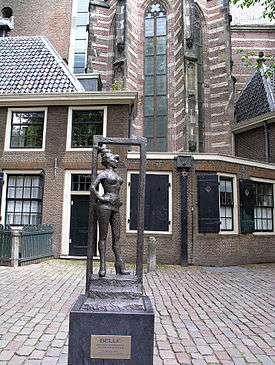International Whores' Day

International Sex Workers Day, or International Whores' Day, on June 2 of each year, honours sex workers and recognises their often exploited working conditions. The event commemorates the occupation of Église Saint-Nizier in Lyon by more than a hundred sex workers on 2 June 1975 to draw attention to their inhumane working conditions.[1] It has been celebrated annually since 1976. In German, it is known as Hurentag (Whore's Day). In Spanish-speaking countries, it is the Día Internacional de la Trabajadora Sexual, the International Day of the Sex Worker. (The Spanish word "trabajadora" is feminine, recognizing that most sex workers are women.)
Background
In the 1970s, French police kept sex workers under increasing pressure. The police reprisals[1] forced sex workers to work increasingly in secret. As a result, protection of sex workers decreased and led to more violence against them. After two murders and the unwillingness of the government to improve the situation, sex workers in Lyon occupied the Saint-Nizier church in rue de Brest and went on strike. The striking workers sang political chants and demanded decent working conditions and an end to stigma.
"When we occupy the churches,
you are scandalised,
religious bigots!
You who threatened us with hell,
we have come to eat at your table,
at Saint Nizier.
[Protest song penned by sex workers who occupied French churches during an eight-day strike in 1975]
The police cleared the church after eight days.[2] The event marks the starting point of an international movement of sex workers for sex workers' rights.[3]
Germany
A reading entitled "Women without rooms" in Bochum, Germany on 29 May 2011 documented that the situation of sex workers has not improved since 1975. The reading was devoted to the sex workers of the neighbouring city of Dortmund, who are oppressed as the sex workers of Lyon were in 1975.[4]
Similar memorials
- 3 March - International Sex Workers' Rights Day.[5]
- 17 December - International Day to End Violence Against Sex Workers.[6]
References
- 1 2 "Internationaler Hurentag – Kirche soll Prostituierte nicht ausgrenzen (International Whores' Day: The church shouldn't excluse the prostitutes)" (in German). Die Welt - Online. 2009-06-07. Retrieved 2011-06-02.
- ↑ "Internationaler Hurentag in Bochum (International Whores' Day in Bochum)" (in German). Bochumer Stadt- und Studierendenzeitung (bsz). 2010-05-17. Retrieved 2013-06-02.
- ↑ "Sag mir, wer die Huren sind (Tell me, where are the whores?)" (in German). Sexclusivitäten - Laura Méritt. Retrieved 2013-06-02.
- ↑ "Frauen ohne Zimmer: Lesung zum Internationalen Hurentag 2011 (Women without room: Reading for International Whores' Day)" (PDF; 414 kB) (in German). Madonna e.V. Retrieved 2013-06-02.
- ↑ "Campaigns & Events". Global Network of Sex Work Projects. Retrieved 2013-06-02.
- ↑ "17. Dezember, Internationaler Tag gegen Gewalt an SexarbeiterInnen! (International Day Against Violence Against Sex Workers)" (in German). no-racism.net. 2010-12-16. Retrieved 2013-06-02.
Further reading
- Agustín, Laura Maria. "Sex at the Margins: Migration, Labour Markets and the Rescue Industry", 2007, Zed Books, ISBN 978-1-84277-859-3
- Agustín, Laura Maria. The Naked Anthropologist .
- Kempadoo, Kamala (editor) & Doezema, Jo (editor). "Global Sex Workers: Rights, Resistance, and Redefinition", 1998, Routledge, ISBN 978-0-415-91829-9
- Leigh, Carol. "Unrepentant Whore: The Collected Works of Scarlot Harlot", 2004, Last Gasp, ISBN 978-0-86719-584-2
- Nagle, Jill. "Whores and Other Feminists", 1997, Routledge, ISBN 978-0-415-91822-0
- Pheterson,Gail. "A Vindication of The Rights of Whores", 1989, Seal Press ISBN 978-0-931188-73-2
- Weitzer, Ronald. 1991. "Prostitutes' Rights in the United States", Sociological Quarterly, v. 32, no.1, pages 23–41.
External links
- "Internationaler Hurentag" (in German). Kalenderlexikon.de. Retrieved 2011-06-02.
- Politics of Sexuality - Sex Work at DMOZ
- Network of Sex Work Projects (International)
- International Sex Worker Foundation for Art, Culture and Education
- International Union of Sex Workers
